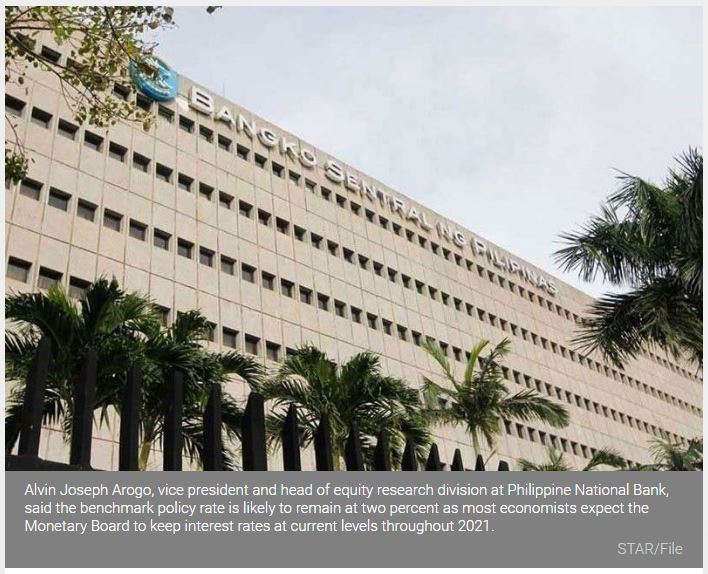Philippines: Policy rate expected to stay at record low
MANILA, Philippines — The Bangko Sentral ng Pilipinas (BSP) is expected to keep the benchmark interest rate at an all-time low of two percent this week as inflation is likely to ease back to the target toward the end of the year, according to bank economists.
Alvin Joseph Arogo, vice president and head of equity research division at Philippine National Bank, said the benchmark policy rate is likely to remain at two percent as most economists expect the Monetary Board to keep interest rates at current levels throughout 2021.
Arogo said supply-side issues continue to drive the quickening inflation and is not driven by an overheating economy amid the rising cases of COVID-19 in the country.
“More importantly, raising the policy rate amid a fragile economy that we have right now and low credit expansion is counterproductive,” Arogo said.
PNB sees inflation averaging at four percent this year after peaking at five percent in March, then easing steadily to hit a more manageable level of 2.6 percent in December. These figures, however, are based on the assumption that tariff on pork imports are reduced and the price of oil stays below $80 per barrel.
Inflation accelerated for the fifth straight month to a fresh two-year high of 4.7 percent in February from 4.2 percent in January, both exceeding the BSP’s two to four percent inflation target.
Arogo said the situation in 2018, when inflation accelerated to 5.2 percent on higher global oil prices prompting the BSP then to hike interest rates by 175 basis points, is different from the situation now, wherein the Philippines is in recession due to the impact of the pandemic.
For his part, Security Bank chief economist Robert Dan Roces said the Monetary Board may not be inclined to move policy rates at this time as previous rate cuts have not been absorbed by the economy.
The BSP emerged as one of the aggressive central banks in the world after slashing interest rates by 200 basis points, including the surprise 25-basis-point reduction delivered in November last year. The central bank also lowered the reserve requirement ratio (RRR) for banks.
“And as policy rate adjustments operate with a lag, this means that the November rate cut has yet to be fully felt,” Roces said.
Roces also said the BSP would continue to do the heavy lifting to support the economy as the fiscal side remains challenged amid the record 9.7 percent GDP contraction last year, the 8.7 percent unemployment rate, and the rising inflation caused by supply-side shocks.
ING Bank senior economist Nicholas Mapa said monetary policy has limited reach to deter a rising inflation due to higher energy prices, African swine fever (ASF) and rising COVID-19 cases.
“A rate cut at this stage would only yield an outcome of still rising inflation and higher borrowing costs, which could be a double whammy for Filipinos already struggling in the midst of the pandemic,” Mapa said.
However, Mapa believes the BSP could and would move quickly to reverse course to “calibrate” policy rates if second round effects emerge from wage or transport fare adjustment and when inflation expectations become disanchored.
“Until either of these two occurrences come to light, we believe the BSP will accommodate the so-called first round effect while staying vigilant for such developments,” Mapa said.
UnionBank chief economist Ruben Carlo Asuncion said the central bank would continue to ride out the upward pressure on the consumer price index (CPI).
“This is so because annualized rates of headline and food CPI at the national and regional levels offered proof that the worst of the food price shocks is in the rearview mirror. These adjusted indices, while still elevated, has stabilized, if not eased, yielding benign to declining monthly percentage changes,” Asuncion said.
Source: https://www.philstar.com/business/2021/03/21/2085795/policy-rate-expected-stay-record-low


 English
English




